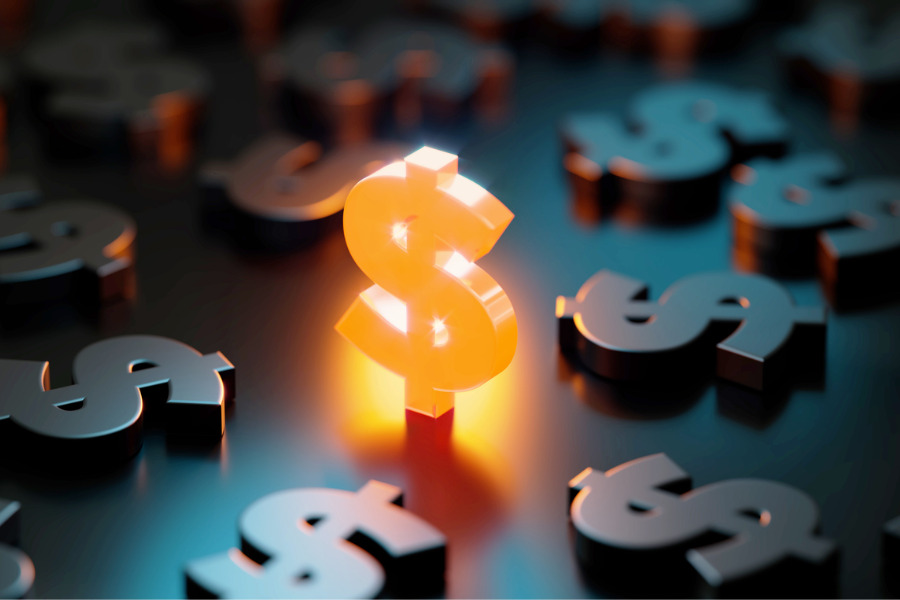

The surging dollar has hurt stocks outside the US but one group at least stands to gain: companies that export to the world’s largest economy.
Those with significant dollar earnings are set for a windfall, with major beneficiaries including heavyweight Asian chipmakers and European industrial and pharmaceutical firms. Shares of exporters to the US have already beaten a broad gauge of non-American companies this year, based on Goldman Sachs Group Inc. indexes.
“Exporters to the US should benefit not only via currency translation, but also in terms of the trade advantage,” George Maris, chief investment officer for global equities at Principal Asset Management, said in an interview in London. “They should be able to show significant margin improvements, whether they’re European or Japanese or Chinese exporters.”
The dollar has gained versus all its major peers this month as a stronger-than-expected US economy has pushed back bets on Federal Reserve interest-rate cuts. While exporters have been sold off in the global risk-off environment, they may be at the forefront of any rebound as the 12-month trailing earnings per share of those in Asia ex-Japan and Europe have tended to move in tandem with the greenback.
Some of the biggest expected gainers are in Asia. Taiwan Semiconductor Manufacturing Co., which gets nearly two-thirds of its revenue from the US, posted its first profit increase in a year in the first quarter even as its scaled back its outlook for future expansion. Shares have rallied 29% this year in Taipei, while the island’s benchmark index rose more than 10%.
The equity markets of Japan and Taiwan are both likely to benefit from the stronger dollar given their relatively high proportion of offshore revenues, according to Morgan Stanley. A number of Japanese stocks have a correlation above 0.8 with the dollar-yen exchange rate, including Toyota Motor Corp., Mitsubishi UFJ Financial Group Inc. and Inpex Corp., strategists including Daniel Blake in Singapore wrote in a client note this month.
Exporters will be helped both by the stronger dollar, and also by their exposure to the US economic resilience. Taiwanese and Korean equities have “strongly positive sensitivity” to US economic activity, Goldman Sachs analysts including Timothy Moe in Singapore wrote in a note this week.
European pharmaceuticals and luxury firms are set to benefit from the dollar rally as they are among the sectors with the highest correlation to a stronger US currency, according to Bloomberg Intelligence.
Danish weight-loss drug-maker Novo Nordisk A/S “is certainly one with an advantage as its production is concentrated in Europe but its biggest sales market is the US,” said Laurent Douillet, senior equity strategist at Bloomberg Intelligence in Paris.
The appreciating dollar and a growing risk-off mood in markets are likely to lead to a stronger outperformance by companies that earn their money outside of Europe, as was the case in 2019, 2020 and 2022, Liberum Capital strategists Joachim Klement and Susana Cruz in London wrote in a note.
UK industrial firms such as Ashtead Group Plc and Rentokil Initial Plc, and Dutch biotech firm ArgenX SE, which all get at least 70% of their revenues from the US, may be some of the major gainers, based on Liberum’s analysis.
While the stronger dollar will benefit exporters, it’s likely to hurt almost everyone else.
In its latest earnings call, Blackstone Inc. said a stronger dollar hurt returns on certain real estate funds with non-US holdings by up to 60 basis points. US-based Akamai Technologies Inc., which earns about half of its revenues abroad, cited the greenback as a headwind.
Monthly returns from the MSCI All Country World Ex-US Index of shares drop by 0.2% for every 1% gain in the US Dollar Index, according to regression analysis by Invesco Asset Management.
“Generally, I would expect outflows when the dollar strengthens,” said David Chao, a strategist at Invesco Asset in Singapore. Cyclical sectors such as basic resources, consumer discretionary firms and financials are all likely to underperform, he said.
Copyright Bloomberg News

Former Northwestern Mutual advisors join firm for independence.

Executives from LPL Financial, Cresset Partners hired for key roles.

Geopolitical tension has been managed well by the markets.

December cut is still a possiblity.

Canada, China among nations to react to president-elect's comments.
Streamline your outreach with Aidentified's AI-driven solutions
This season’s market volatility: Positioning for rate relief, income growth and the AI rebound
